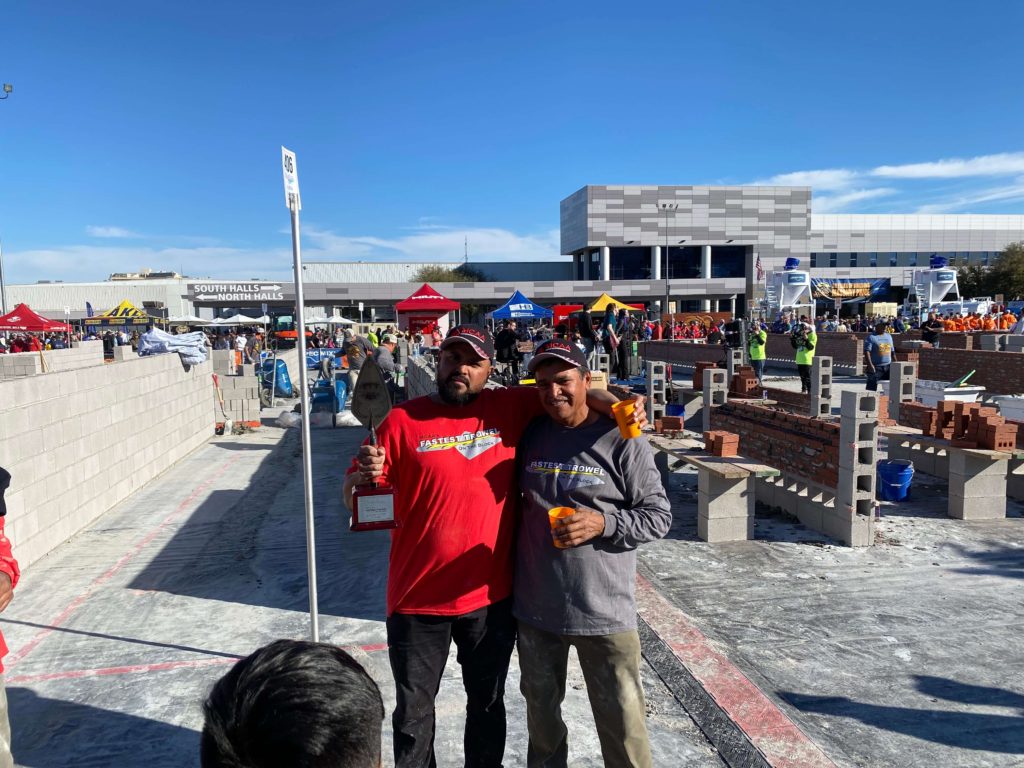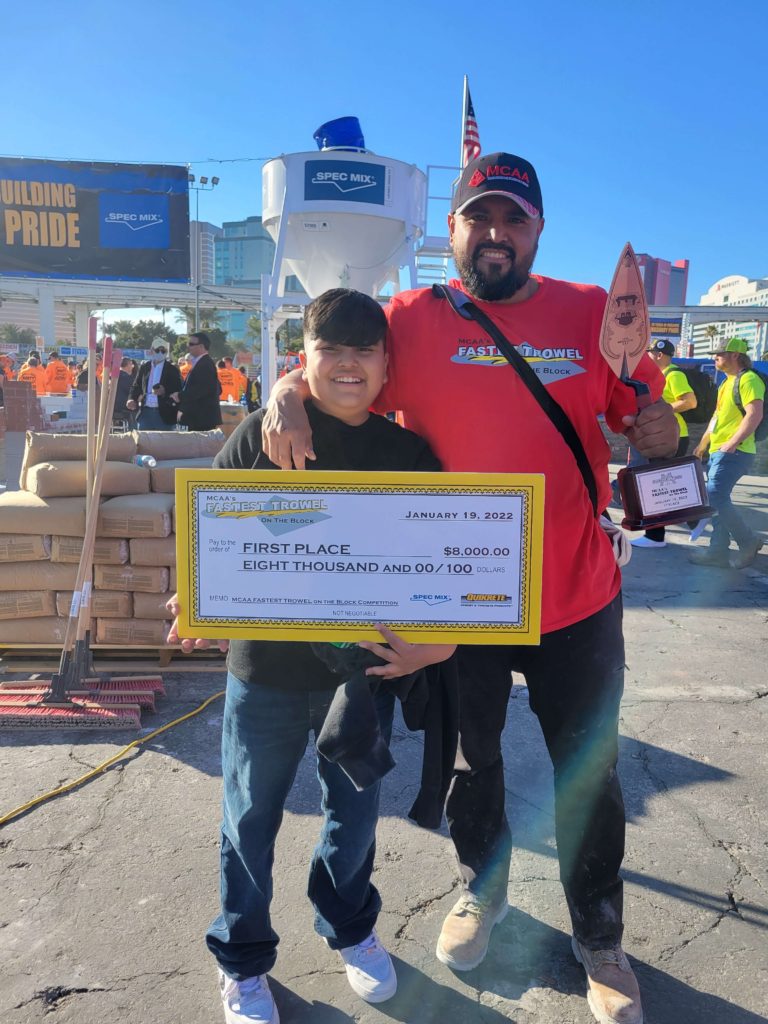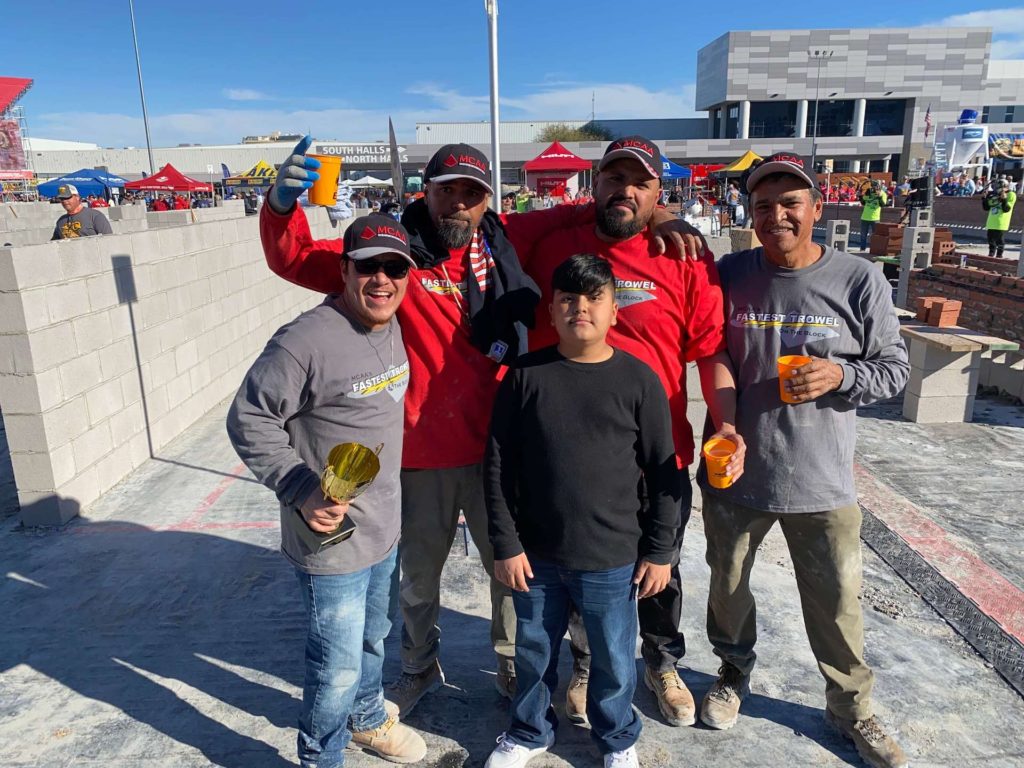Words: Roberto Cimental
Photos: MCAA/MASONRY Magazine, Roberto Cimental
Editorial Note: MASONRY regularly highlights long-serving members of the industry through our Wall of Fame series. Separate from the MCAA’s Masonry Hall of Fame, this series is intended to shine a spotlight on exemplary members of the trade who have spent most of their careers in the field. If you know someone who fits as a nominee for this series, please email us at dkamys@masoncontractors.org or reach out to us on social media.
For this issue’s Wall of Fame feature, we had the chance to speak with Roberto Cimental, the winner of the 2022 MCAA’s Fastest Trowel On The Block competition during MASONRY MADNESS ® Day at the World of Concrete. Roberto has competed in Las Vegas for several years, and is a passionate member of the industry.
MASONRY: How old were you when you got started in the industry?
Roberto Cimental: I was about 11 years old the first time my father took me to work with him. I was 16 years old when I became a mason.
MM: Can you tell us about your background and how you got started at such a young age?
RC: I’m from a small city in Mexico called Jaral del Progreso, Guanajuato. I came to the United States in 1991 when I was six years old. By the time we came, my father had already been here for a long time working in the masonry industry.
My dad started taking my brother and I to work with him [when] I was about 11 years old. He would just take us to work on Saturdays. As I got older, I would work weekends and during my summer vacations from school. Eventually I left college, needing only a few credits to finish my business degree, to work as a mason full time. I later went back to school for a degree in Computer Science.
MM: What drew you to working in the masonry industry?
RC: At first, the money drew me to the masonry industry. But when I became a mason, I started to like the job even more.
MM: What are some of your earliest memories at work?
RC: Some of my earliest memories at work are from when my dad would take me to work with him. Just waking up so early made me think ‘Woah, I’m becoming a man’ [laughs]. I didn’t do much work then, though. I was about 11 years old.

MM: What’s kept you in the industry this long?
RC: The money kept me in the industry for a long time, but when I found out about the Fastest Trowel On The Block competition that became my motivation. Masonry is like a culture in my family. Most of my uncles and dad have been masons at one point in their life. Actually, my dad is still laying block at the age of 62!
MM: How did you progress through the industry?
RC: Like I said, my dad started taking me to work at a very early age. I wasn’t even old enough to work legally [laughs]. When I got a little older, I would work during my summer break from school. I started as a tender, but I became a mason very quickly.
I remember, my dad also tells this story, when I started laying block it was as if I had already been blocklaying for a couple of years. I really never needed my dad to stop and show me how to spread mortar, butter the blocks or lay the actual blocks. I’ve been a Foreman for about 15 years. Not a commercial work foreman though (although I’ve been a commercial mason too), I’m a residential Foreman. The difference is that commercial Foremen don’t really lay block. I, on the other hand, lay from 500 to 600 blocks in my 5 to 6 hour work days. The next step now is to have my own construction company!
MM: What is the hardest part about working in this industry?
RC: Physicality. You get used to how physically demanding this job is. The hardest part of this job is working during the summer. I live in Arizona, so you can imagine the worst part is when it rains. The humidity is horrible! [laughs]
MM: What do you like about the industry?
RC: One of the things I like about working in the industry is that it keeps me strong and healthy. You have to be strong to lay 500 plus a day, and I think that all the sweating we go through allows us to sweat out a lot of toxins in our body therefore keeping us healthy. One of my favorite things about working in the industry is that I get home from work around 11:30 almost every day. When most people are on their lunch, I’m on my way home!

MM: What is your legacy?
RC: I would want my legacy to be that I am truly the best block layer ever. In my 20-plus-year career, I have never had to go back and fix a wall, ever! I think that says a lot. Not too many, if any, masons with that much time in the industry can say that. Every wall I build I try to build as best as possible, and every block I try to lay perfectly.
The Fastest Trowel Competition is done with 8-inch block, but I don’t really lay a lot of 8-inch block. I am even better at laying other types of block, 6-inch, Dooley block, slump block, etc.
Editorial Notes:
Slump Block: Slump Block is a concrete block unit that is removed from the mold before it has a chance to completely set. This causes the concrete block to keep a slumped appearance like adobe brick. (RCP Block)
Dooley Walls: There are many variations on the “Dooley Walls” depending on the application and locality. Most are built using 4″ walls spanning between vertical pilasters that carry the wind loads into the ground. (Eng-Tips)
MM: What does this work mean to your family?
RC: This work means a lot to my family. My father, who still works in the industry, taught me how to work. My brother is also a mason, he actually competes in the Fastest Trowel On The Block Competition too. My dad has been a mason for about 40 years, my brother and I have done it for 20 plus years and most of my uncles and cousins have also been masons at one point in their life.
You can say the laying block is almost like a culture for us. More importantly, the work has helped my family succeed here in the United States along with many others hoping to make a better life for their families.
MM: Do you have any advice for people who are going into the field?
RC: My advice is go to school! [laughs] But if you really want to be a mason, you have to work hard and with courage. You can never be scared of work. You have to be tough to withstand working through summertime.
Like with anything else, you should always try to be the best you can, not necessarily because of a competition or to say you’re the best. Being the best you can at anything makes everything easier and more enjoyable.
MM: What does being recognized in the Wall of Fame mean to you?
RC: I think that I’m really just getting started with the things I want to accomplish. To be recognized for what I’ve accomplished thus far does mean a lot to me, but mostly because of my kids.
I want my kids to always be proud of who their dad is, and I want them to be motivated by the things I’ve done so far and what I will accomplish still. Not just what I’ve done but how I did it with integrity. I want them to one day be like, “My dad was incredible! He was a basketball champion, soccer champion, always an honor student and graduated college, and is now The Best Block Layer in the World.”
